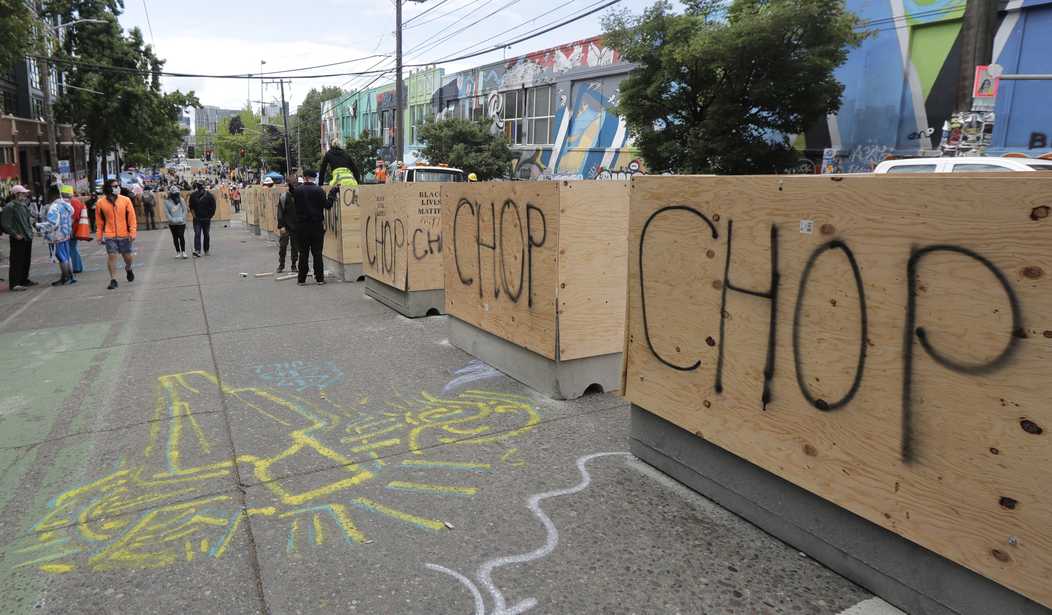Remember the Capitol Hill Autonomous Zone that was set up by activists and “protesters” in June of 2020? The real start of the CHAZ happened on June 8 when police rather suddenly pulled out of the East Precinct police station and boarded up the windows and doors. That gave the mob the sense that they were now in charge of the area and they quickly tagged buildings up and down the street with “ACAB” the abbreviation for “all cops are bastards.” And a little more than a day later a dispute broke out over tagging which led to the first police action by CHAZ’s self-appointed leader/warlord Raz Simone.
What we didn’t know at the time was that on the same day police effective handed control of CHAZ to the mob, Mayor Jenny Durkan’s administration was seriously considering the idea of permanently giving the precinct which police had just vacated over to Black Lives Matter:
That June, as cops lobbed tear gas from behind barricades, and protesters on the streets surrounding the precinct called for the Police Department to be defunded, Durkan’s office behind the scenes briefly contemplated handing over the multimillion dollar property that had become the focus of the demonstrations.
Calvin Goings, the director of the city’s Department of Finance and Administrative Services (FAS), emailed three memos and a draft resolution to Durkan on the afternoon of June 8, 2020 — at about the same time police were abandoning the East Precinct on Capitol Hill.
The draft resolution for transferring the property to Black Lives Matter Seattle-King County (BLMSKC) included a July 1 effective date, and Durkan’s office subsequently discussed the possibility with the nonprofit, which at one point pushed to remake the building as a hub for public health and community care.
There’s no doubt this happened. The Seattle Times has posted all three of the memos. The plan was under consideration for about a week even as the CHAZ/CHOP degenerated into chaos. But despite having proof, a spokesperson for Durkan’s administration (she recently left office) has denied it.
Durkan representatives have denied the building was offered and downplayed the notion that City Hall seriously pursued a transfer, attributing the idea to some demand letters from activists and to City Councilmember Kshama Sawant, who on June 11, 2020, tweeted she would sponsor legislation to convert the property into a community center…
But the FAS memos from June 8, 2020, demonstrate that Durkan’s office was interested in a transfer before the precinct was abandoned and before Sawant weighed in.
Chelsea Kellogg, Durkan’s spokesperson, said, “There was no plan to transfer the East Precinct.” She also claimed that the memos suggesting otherwise hadn’t been requested by the mayor but were sent to Durkan by the Department of Finance and Administrative Services (FAS), i.e. on their own initiative.
However, Melissa Mixon, a spokeswoman for FAS said that was not true. “The Durkan administration directed FAS — in its capacity as the city’s real estate and facility management agency — to outline the process to transfer the East Precinct to BLMSKC,” Mixon said.
To sum all of this up, when the protests that led to the CHAZ/CHOP were at their height, Mayor Durkan’s office considered handing the police precinct over to BLM permanently. They even had discussions with BLM about it, but ultimately BLM didn’t want the building and the idea was dropped. Since then, the mayor and her office have sat on this information and when asked directly, denied it was something they either considered or proposed.
One reason Durkan might be denying this is that the city is being sued by business owners who are arguing the creation of CHAZ/CHOP was an abdication of law and order by the city, i.e. they defacto handed CHAZ/CHOP over to a mob. It’s not hard to see how these memos about handing over the police station play into that argument.
Update: Meant to include this but last week Raz Simone was sued by five women, for of whom claim he sex-trafficked them:
The plaintiffs say that Simone targets young, vulnerable women who are involved in sex work or susceptible to it. They said he wins them over with affection, and pitches the relationship as a chance to grow, find success, and be a part of his “family.”
Once persuaded, they said Simone imposed strict rules on what they could eat, and how to act. He placed a money quota on them, pressured them to meet it by stripping or performing sex acts, and took the money they made, they said in the lawsuit. They said Simone used coercion, threats, and violence to make them comply, and used them as fodder for his music.
Simone has repeatedly denied these allegations, in an interview and in a music video he published following KUOW’s initial story. He denied the allegations again, in a letter drafted by his lawyer and sent to KUOW.








Join the conversation as a VIP Member